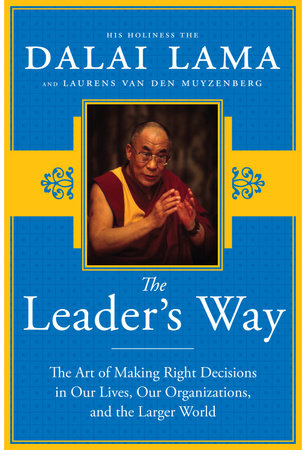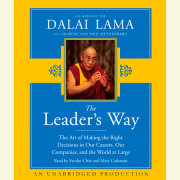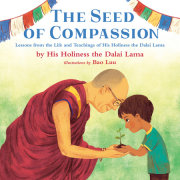Introduction
His Holiness the Dalai Lama
Generally, Buddhist monks are somewhat isolated from the rest of society, often secluded in peace while praying for the welfare of all sentient beings and for our planet. Although I am one such monk, I also have responsibilities with regard to the Tibetan government-in-exile, which offers me a broader perspective in that I interact with people from all over the world. In the course of my travels I have met many different kinds of people, some of them poor, some of them rich, each of them occupying their own position in the world. People appear to trust me; therefore many have talked to me about their lives, their hopes, and their concerns about the future. In the end, I have learned that what almost everyone is seeking is a measure of happiness.
Why am I writing this book now? Because I feel we all should have a sincere concern and responsibility for how the global economy operates, and an interest in the role of businesses in shaping our interconnectedness. Times have changed, and I believe that leaders of religious traditions — with their ability to take a long view of the human condition — should participate in discussions of global business and economics. Our world faces very serious problems. Those that are of particular concern to me include the overwhelming degrees of poverty in poor countries; the fact that even in prosperous countries the sense of satisfaction with life has been stagnating since 1950; the negative impact that our negligence and our ever-increasing population and rising standard of living are having on the environment; and finally, the lack of peace in so many parts of the world.
Because Buddhism takes a rational and logical attitude to such problems, its approach is sometimes easier to understand for those who are not religious that for those who are. In Buddhism, there is an emphasis on human values and on how we can be taught to take a holistic approach to solving society’s problems. So if we view Buddhist teachings in terms of secular ethics and fundamental human values, then perhaps they too have something to contribute to the business world.
Buddhist concepts about wealth, work, consumption, and happiness are somewhat different than their Western counterparts. Happiness is more than merely satisfying our material wishes and desires. The root of happiness is not in what we desire or what we get but somewhere altogether different. It stems from a place of inner contentment that exists no matter what we gain or achieve.
Buddha recognized that self-oriented drives were very powerful. However, he came to the conclusion that the drive for satisfying the desires of the self was impossible to achieve, a never-ending cycle. People cannot be truly happy unless they have friendships and good relationships with other people. Furthermore, good relationships are reciprocal. It is impossible for people to build positive relationships with others if their only aim is to satisfy their own desires. So I believe that governments and organizations, which bring people into contact with one another, as well as create jobs and wealth, have a very important role to play in these questions of the standard of living and human happiness — and where the two may intersect.
I do not pretend that the solutions to the world's problems are simple or straightforward.
While working on this book, I have come to understand how difficult it can be for businesspeople to make the right decisions. When the leader of a company makes a decision, it affects all the employees and many others who buy its products or act as suppliers, and therefore the quality of business decisions is critical. This becomes especially complex for large, global corporations operating in many countries. For this reason, the decision maker must not only be competent, but must also have the right motivation and the right state of mind. Competence specific to business measures both talent and knowledge; as such, it is beyond the scope of this book. However, observing and correcting your motivation is an important aspect of Buddhist practice and is discussed in detail here, as is cultivating the right state of mind.
Fundamental to Buddhist philosophy is the notion that suffering exists, and that the Buddha calls on all of us to help alleviate it. My aim in this book is the same: to enable readers and leaders to reduce suffering and increase satisfaction with life as a whole by helping them to understand more clearly what happens in their minds and the mind of others. As a consequence, this book will help leaders everywhere make good decisions that will generate a better quality of life for themselves, their organizations, and everyone else affected by those decisions.
My own interest and thinking about business and economics has evolved over the last 50 years. My formal training has been of an entirely religious and spiritual character; since my youth, my field of study has been Buddhist philosophy and psychology. To some extent, due to my interaction with Tibetan and Chinese members of the Communist Party, I gradually learned about different economic systems. By inclination, I found I first leaned toward socialism, but as I watched the economies in socialist countries stagnate while the free-market economies grew clearly more dynamic, I became particularly interested in what had gone wrong with the socialist economies and in the positive aspects of the free market (though I do remain concerned that the free-market system tends to increase the gap between the rich and the poor).
In 1990, I received a letter from Laurens van den Muyzenberg, an international management consultant. He suggested that rather than seeking to combine the common themes of communism and Buddhist thinking, as I had earlier envisaged, it would be more effective to consider how capitalism could be improved in an attempt to address our collective concerns. I found the idea appealing and asked him to visit me; we met many times over the intervening years. Then in 1999, Laurens suggested that given the increasing interest in governance among global companies — and the fact that the Buddhist tradition includes many theoretical and practical instructions that would be helpful to people in businesses, especially their leaders — I should be able to make a contribution to the literature on the subject. And thus, this book was born. We agreed at the outset that we wanted the book to be of practical use and to help businesspeople make better decisions. We decided that Laurens would describe the business issues and I would explain how to apply Buddhist teachings to the issues he raised.
I advised Laurens to take a holistic approach. By “holistic” I meant that he should look at issues from many different perspectives, not solely that of a management consultant from the West. I believe one of the main problems in the world today is that, while the amount of information is growing exponentially, people are becoming more and more narrow in their world view and are no longer able to understand how all these ideas for improving society interact.
In writing this book I have selected subjects that I think are important and Laurens has investigated them based on his own experience, discussion with professional colleagues, and research of published information. He also interviewed business leaders who were active Buddhist practitioners about the impact of Buddhism on their approach to business. We do not claim to have found all the answers, but we have taken pains to present Buddhist teachings in a useful way that businesspeople can easily understand.
I am not interested in converting readers of this book to Buddhism. My interest is to present Buddhist concepts in a way that is useful to people from all religious faiths, and even to those without any specific religious faith.
This book is not about Buddhism as a religion or as a way of life. I believe that people can find values to help them lead a good and responsible life in all religious traditions. I also believe that people who do not follow any religion can lead a good and responsible life. The ideas in this book are therefore possible for everyone to accept and practice.
I have faced a great many difficulties in my life. lost my freedom at the age of 16 and became a refugee at 24. Nevertheless, I can say that due to my Buddhist training, I am happier than many people who take freedom and a country they call their own for granted. This ability to maintain my peace of mind is entirely due to the teachings I have received and my consistent efforts to put them into practice by training my mind. My sincere hope is that with this book, I can help our leaders — in business and global organizations — learn and apply this same training to bring about a more peaceful and sustainable planet.
Copyright © 2009 by His Holiness The Dalai Lama. All rights reserved. No part of this excerpt may be reproduced or reprinted without permission in writing from the publisher.










